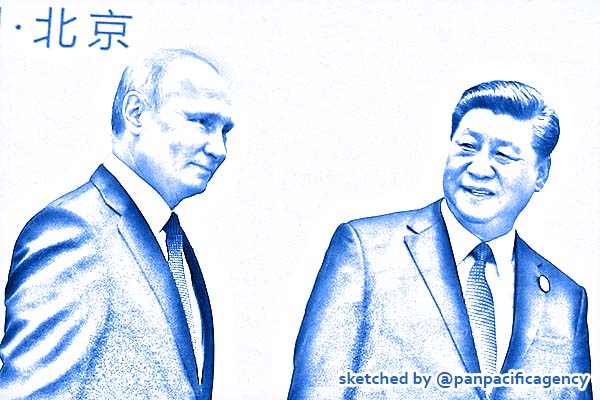China’s Xi to meet Russia’s Putin before Winter Olympics opening

Xi Jinping has met Vladimir Putin more times than any other foreign leader since he took power in 2013. Photo: AFP. Sketched by the Pan Pacific Agency.
BEIJING, Feb 4, 2022, Al Jazeera. China’s President Xi Jinping is poised for his first face-to-face meeting with a world leader in nearly two years on Friday when he hosts Russian counterpart Vladimir Putin, with the pair drawing closer as tensions grow with the West over Ukraine and other issues, Al Jazeera reported.
Xi has not left China since January 2020, when the country was grappling with its initial COVID-19 outbreak and locked down the central city of Wuhan where the virus was first detected.
He is now readying to meet more than 20 leaders as Beijing kicks off a Winter Olympics it hopes will be a soft-power triumph and shift focus away from a build-up blighted by a diplomatic boycott and coronavirus fears.
Xi and Putin will meet in the Chinese capital before their nations release a joint statement reflecting their “common views” on security and other issues, a top Kremlin adviser said at a press briefing on Wednesday.
The two leaders will then attend the Olympic opening ceremony on Friday evening.
Spiralling tensions with the West have bolstered ties between the world’s largest and most populous nations, and Putin was the first foreign leader to confirm his presence at the opening ceremony.
He hailed Russia’s “model” relations with Beijing in a December phone call with Xi, calling his Chinese counterpart a “dear friend”.
China’s state-run Xinhua news agency carried an article from Putin on Thursday in which the Russian leader painted a portrait of two neighbours with increasingly shared global goals.
“Foreign policy coordination between Russia and China is based on close and coinciding approaches to solving global and regional issues,” Putin wrote.
He also hit out at the US-led Western diplomatic boycotts of the Beijing Olympics that were sparked by China’s human rights record.
“Sadly, attempts by a number of countries to politicise sports for their selfish interests have recently intensified,” Putin wrote, calling such moves “fundamentally wrong”.
‘Common stand’
For its part, China has become more vocal in backing Russia in its dispute with NATO powers over Ukraine.
Last week, China’s Foreign Minister Wang Yi called Russia’s security concerns “legitimate”, saying they should be “taken seriously and addressed”.
On Thursday, Wang held face-to-face talks with his Russian counterpart, Sergey Lavrov, in Beijing before Xi and Putin’s meeting.
Wang was quoted by the state-owned China Daily as saying that Beijing is ready to work with Moscow “to deepen the time-honoured friendship and comprehensive strategic coordination between the two countries”.
Reporting from Beijing, Al Jazeera’s Katrina Yu said this “does not necessarily mean that China would welcome any potential attack on Ukraine”, citing the Chinese government’s good relations with Kyiv, an important trading partner that is also part of the Belt and Road infrastructure initiative.
“Certainly, Xi right now, heading into the Winter Olympics, doesn’t want anything to disrupt stability,” she added, noting, however, that discussions on Ukraine are expected to be high on the agenda of the two leaders’ talks on Friday.
“They really have been trying to convey a united front – both leaders have experienced souring relations with the US and its allies over the recent years,” Yu said. “And China has signalled that it would support Russia economically should the US imposed any sort of crippling sanctions.”
Moscow is looking for support after its deployment of 100,000 soldiers near its border with Ukraine prompted Western nations to warn of an invasion and threaten “severe consequences” in response to any Russian attack.
China enjoyed plentiful support from the Soviet Union – the precursor to the modern Russian state – after the establishment of Communist rule in 1949, but the two socialist powers later fell out over ideological differences.
Relations got back on track as the Cold War ended in the 1990s, and the pair have pursued a strategic partnership in recent years that has seen them work closely on trade, military and geopolitical issues.
Those bonds have strengthened further during the Xi Jinping era at a time when Russia and China find themselves increasingly at odds with Western powers.